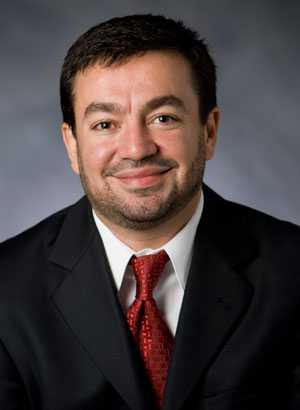Questions for… Imam Abdullah Antepli
by Johanna Ginsberg
NJJN Staff Writer
April 23, 2009

Imam Abdullah Antepli is the first Muslim chaplain serving at Duke University in North Carolina, where he also teaches an introduction to Islam course in the divinity school. Antepli completed undergraduate work in his native Turkey and earned a master’s degree from Hartford Seminary in Connecticut, where he is a doctoral candidate. He is the founder of the Muslim Chaplains Association and a member of the Association of College and University Chaplains.
He and Rabbi Amy Small of Congregation Beth Hatikvah, a Reconstructionist synagogue in Summit, co-teach a class at Hartford Seminary on the Abrahamic religions. On Friday, April 24, he will speak at Small’s synagogue at 8 p.m. on Responses to the War in Gaza.
Ahead of the talk, he heaped praise on Small for inviting him to speak. “We are all in our cocoons, and the source of our information is biased. Not many people go out of their way to pay attention to what the other side is seeing,” he said in a recent phone conversation.
NJJN: You seem to be the exception in your desire for Muslim-Jewish dialogue. Why is there so little, and what has made you the exception?
Antepli: There is little going on in terms of Muslim-Jewish dialogue because of the Israeli-Palestinian conflict. That conflict and its consequences go beyond that space, beyond 100 years. Without putting blame on anyone, because of that conflict, Jews and Muslims are divided. Fourteen hundred years of often good relationships went through the drains, forgotten by many Jews and many Muslims. It’s very tense. People are so wounded on all sides, and the wounds are very fresh.
I grew up a victim of the divide. I grew up being taught about Jews and Judaism, all sorts of negative stuff. In southeast Turkey, that’s the information I received. It was as if Jews and Muslims first met over this conflict. Our hearts and minds were poisoned.
God Almighty was merciful and did not allow me to live with this poison. He conducted me on a different journey. I met Jews when I lived in southeast Asia for eight years before coming to the United States. The first Jews I met were business people from Europe and the U.S. They were not religious, but we were able to establish friendships — human to human relationships.
When I moved to the United States six years ago, I came to the Hartford Seminary, where the whole focus is on Abrahamic dialogue and interfaith dialogue…. I started taking classes and studied Torah, and I found that…ethically, morally, and spiritually Judaism and Islam are so similar; there’s an inevitable chemistry and attraction [between the people]. As someone who takes religion seriously, I was able to connect with Judaism, theologically and in the understanding of the worldview, in a very short while. That strengthened my sense of responsibility.
NJJN: How do you discuss Israel and Gaza and related issues with Jewish groups? What are the challenges? How do you overcome them?
Antepli: Gaza is a very difficult issue. Gaza is not good news whatsoever. It just provides another level of pain. Thank God, Baruch Hashem, my relationship [with the Jewish community at Duke] was very strong and already ongoing when the war began.
But there are clear differences in the way we see Gaza. Having a strong relationship enables us to have painful conversations despite our significant disagreements.… This is the basic entry point for any serious dialogue. The Muslim community openly expresses its criticism and its anger and frustration toward the State of Israel’s policy on Gaza, but deliberately not toward Israel or Israelis in general. We have been able to criticize the way the situation was handled and the tragic situation in which innocent civilians were injured.
[The war in Gaza] was counterproductive. It was done in the name of security, but it was a disservice to Israeli security. I do not think Israel is safer now.
NJJN: What are the challenges you face as the first Muslim chaplain at Duke?
Antepli: I face two sets of challenges: one internally, within the Muslim community, and one externally with the larger non-Muslim community on campus and beyond.… The 550 Muslim students, faculty, and staff at Duke are representative of the entire 1.3 billion Muslims in terms of their ethnic, political, psychological, and spiritual diversity. I am the chaplain for all of them. How do you create a Muslim community out of this diverse group?
Externally, the main challenge is not unique to me; it’s the challenge facing all Muslims living in post-9/11 United States. A large part of the community bought the idea that Islam is violent and Muslims are terrorists. My arrival and strong presence was not good news for people with these stereotypical ideas about Muslims…. This was an issue for people of a very particular Christian background, and there was also criticism from some in the Jewish community, especially after the Gaza War. But the overwhelming majority of people have offered support and love and care.
For more information about Imam Antepli’s visit to Congregation Beth Hatikvah, contact the synagogue at 908-277-0200.
Comment: [email protected]

Leave a Reply